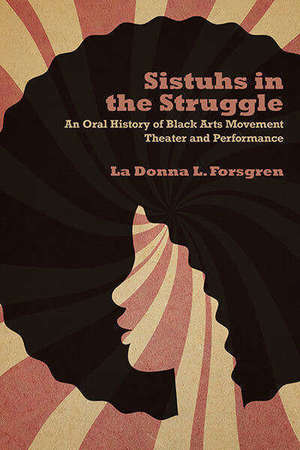“One of the things that appeals to me most about the Black Arts Movement is that it wasn't just about creating art — it was about reaching people.”
— La Donna L. Forsgren

La Donna L. Forsgren is an associate professor in the Department of Film, Television, and Theatre; concurrent faculty in the Gender Studies Program; and affiliated faculty in the Department of Africana Studies at the University of Notre Dame. Her areas of specialization include African American theatre and performance, feminist theories, dramaturgy, and Black liberation struggle.
Her latest book, Sistuhs in the Struggle: An Oral History of Black Arts Movement Theater and Performance (Northwestern University Press, 2020), is the first oral history to fully explore the contributions of Black women intellectuals to the Black Arts Movement. Forsgren documents this vital yet under-researched chapter in African American, women’s, and theater history through interviews with Black women theater artists and activists about how they disseminated the Black aesthetic and emboldened their communities.
She is also the author of In Search of Our Warrior Mothers: Women Dramatists of the Black Arts Movement (Northwestern University Press, 2018). More information can be found on her faculty page.
Video Transcript
I am a theater historian. I focus on Black women's contributions to the Black Arts Movement of the 1960s and ’70s. And what I found was they made profound contributions to Black art and they helped galvanize Black America into action. They produced amazing plays. They were produced at Black Arts theaters. They were produced throughout the country. But many of them never published their plays.
Because my work is recuperative, then the whole idea is, I go out and I speak to these women. So my latest book project is an oral history. So I went out and I interviewed 30 Black women — and if they had passed away, their children, their colleagues — and I interviewed them about their work and I asked them, “How did you define the Black aesthetic?” “What was your purpose for creating art?” “What did you envision in terms of liberation?” And I put that into conversation with their activism, because these weren't just artists — they were activists as well.
One of the people I was able to interview was Doris Derby, and she was one of the co-founders of the Free Southern Theater, and I thought that she was all about theatre, that that's why she helped found that theatre in Mississippi. Not the case at all. For her, theatre was merely a vehicle to liberate Black people. So they performed plays on porches, out in cotton fields. They brought in everyday workers to come and watch these theatre productions, and the most important part was not necessarily the performance — it was the conversation that would happen after the performances. And they would talk about issues that were impacting the rural South at that time, so performance was only a vehicle to talk about issues that were impacting these communities, and they did so in a very brilliant way. It was all about getting the community together, and during these productions, they brought white and Black people together to have these conversations, which was considered very dangerous for the time.
To me, that's one of the things that appeals to me most about the Black Arts Movement, is that it wasn't just about creating art — it was about reaching people. It was about changing their minds and their hearts and their spirits. It was about showing children that they were worth something, and that's the type of art they created.
What attracted me most to Notre Dame is the fact that it's holistic. Its mission is all about a holistic education, about educating the mind, the body, and the spirit, and that's the focus of my work. Being surrounded by people who care, who care and who are passionate about their work and about the collective well-being of all of society. I want to be a part of that. Notre Dame, right now, we're having important conversations about change and about making our society more equitable, more just, and that appeals to my spirit and my mind. I want to be a part of those conversations.
Originally published by at al.nd.edu on October 15, 2020.